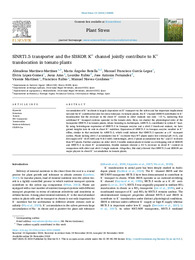Título :
SlNRT1.5 transporter and the SlSKOR K+ channel jointly contribute to K+
translocation in tomato plants |
Autor :
Martínez Martínez, Almudena 
Torner, Carlos 
García-Legaz, Manuel Francisco
Macias, Maria J 
Amo, Jesus
Rubio, Lourdes
Fernandez, Jose Antonio 
Martínez, Vicente
Rubio, Francisco
Nieves-Cordones, Manuel  |
Editor :
Elsevier |
Departamento:
Departamentos de la UMH::Biología Aplicada |
Fecha de publicación:
2024-11 |
URI :
https://hdl.handle.net/11000/34017 |
Resumen :
Accumulation of K+ in shoots is largely dependent on K+ transport via the xylem and has important implications
not only for K+ nutrition but also for stress tolerance. In tomato plants, the K+ channel SlSKOR contributed to K+
translocation but the decrease in the shoot K+ content in slskor mutants was only ~15 %, indicating that
additional K+ transport systems operated in the tomato stele. Here, we studied the physiological roles of the
transporter SlNRT1.5 in tomato plants, whose homolog in Arabidopsis, AtNRT1.5, contributed to xylem K+ load.
By using heterologous expression of SlNRT1.5 in Xenopus oocytes and a slnrt1.5 knock-out mutant, we have
gained insights into its role in shoot K+ nutrition. Expression of SlNRT1.5 in Xenopus oocytes resulted in K+
efflux, similar to that mediated by AtNRT1.5, which could indicate that SlNRT1.5 operates as a K+ transport
system. Plants lacking slnrt1.5 accumulated less K+ in shoots than WT plants under low external pH (4.5), and
low supply of K+ (0.05 mM) and N (0.5 mM). Interestingly, slnrt1.5 plants accumulated less Na+ and Cl- in shoots
than WT plants. Further analyses on slskor slnrt1.5 double mutant plants revealed an overlapping role of SlSKOR
and SlNRT1.5 in shoot K+ accumulation. Double mutants showed a 40 % decrease in shoot K+ content in
comparison with slskor and slnrt1.5 single mutants. Altogether, this study showed that SlNRT1.5 and SlSKOR are
major players in shoot K+ accumulation in tomato plants.
|
Palabras clave/Materias:
Potassium
Tomato
NRT transporter
Translocation
Nutrient deficiency
CRISPR-Cas |
Área de conocimiento :
CDU: Ciencias puras y naturales: Biología |
Tipo de documento :
info:eu-repo/semantics/article |
Derechos de acceso:
info:eu-repo/semantics/openAccess |
DOI :
https://doi.org/10.1016/j.stress.2024.100689 |
Publicado en:
Plant Stress, 14 (2024) |
Aparece en las colecciones:
Artículos - Biología Aplicada
|
 La licencia se describe como: Atribución-NonComercial-NoDerivada 4.0 Internacional.
La licencia se describe como: Atribución-NonComercial-NoDerivada 4.0 Internacional.
.png)
